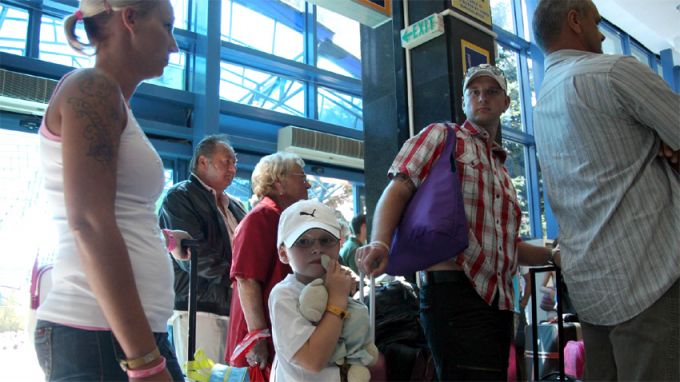
Since the beginning of 2014 the conflict between Russia and Ukraine has significantly reduced export of Bulgarian goods to the region. Export-oriented companies from different sectors of the Bulgarian economy suffered losses. These are manufacturers of petroleum and bitumen materials, pharmaceutical companies, and agricultural producers. The number of tourists from Russia and Ukraine declined, as well as the number of deals with holiday properties.
According to preliminary data of the National Statistical Institute, for the period January - October 2014, exports of Bulgaria to Ukraine decreased by 63 percent, which equals some 236 million euros, compared to the same period of 2013, as the losing companies are mostly manufacturers of building materials and pharmaceutical companies.
After in response to sanctions by the EU and the US, Moscow banned imports of agricultural products from the EU, USA, Canada, and Australia, this had a negative effect on Bulgarian exports, too. The decline of exports to Russia from the beginning of 2014 to the end of October was 8.6 percent, which equals some 40 million euro. Exporters of fruits and vegetables, the dairy industry and fisheries were among the worst affected. However, Bulgaria exports less than 1 percent of its agricultural produce to Russia, according to a report of DG AGRI of the European Commission, prepared shortly after the measures taken by Moscow.
The decline of the ruble led to a number of economic problems in Russia. A number of large Russian tour operators went bankrupt. EU travel restrictions on state-owned companies and enterprises also led to a slight decline of the number of Russian tourists in Bulgaria. Here is more from Svetlana Atanasova, Executive Director of the Bulgarian Association of Travel Agents (BATA).
"Overall, currency fluctuations affect travels, because this is a service that is easy to cancel. But given that Bulgaria is in the lower price category, we hope that the decline will not be huge. There is a slight decrease in the number of reservations compared to the past winter.”
Annually, Bulgaria is visited by an average of about 7.5 million foreign tourists and tour operators will try to compensate for the reduced number of Russian tourists and attract more tourists from Romania, Greece and Turkey.
The declining number of Russian tourists also affected the holiday home market. Currently about 360,000 apartments, mainly on the southern Black Sea coast, are the property of Russians, according to data by the Russian embassy. Vice-President of the National Real Estate Association, Emil Ganev, believes that the geopolitical crisis in Ukraine has led to the decline of the number of both Russian and Ukrainian customers:
"This decline is somewhere around 10 percent. At the end of the year the ruble dropped a lot, which affected the savings of Russian citizens. Russian who had savings in rubles lost most of them. And if they had intentions of buying a real estate property abroad they would have probably postponed it. On the other hand, in such a situation, when a national currency depreciates fast people often look at investing money in property as one of the best opportunities."
English: Alexander Markov
Bulgaria is making the necessary progress towards adopting the euro, according to representatives of the European institutions whom Finance Minister Temenuzhka Petkova met with. This progress will allow Bulgaria to request extraordinary convergence..
Financial and tax stability has been shaken in recent years so it is good that a government has been formed, said Vasil Velev, chairman of the Bulgarian Association of Industrial Capital, at a joint press conference of employers. "Romania was..
The Ukrainian parliament has authorized the purchase of two Russian nuclear reactors from Bulgaria, Euractiv reports. The energy committee of the Ukrainian parliament greenlighted the purchase of two old Russian nuclear reactors to expand the..
The Bulgarian National Bank (BNB) has posted, to its website, the answers to important questions connected with the adoption of the euro and the..
The euro area annual inflation rate was 2.5% in January 2025, up from 2.4% in December 2024. In Bulgaria, it accelerated more sharply in January to 3.8%..
89% of German investors in Bulgaria would choose Bulgaria again for their investments . This is indicated by a study by the German-Bulgarian Chamber of..

+359 2 9336 661
